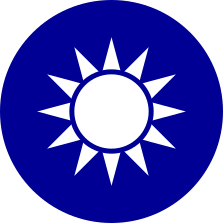Ministry of National Defense (Republic of China)
The Ministry of National Defense of the Republic of China (MND; Chinese: 中華民國國防部; pinyin: Zhōnghuá Mínguó Guófángbù) is a cabinet-level agency under the Executive Yuan responsible for all defense and military affairs of Taiwan. The MND is headed by Minister Yen Teh-fa.
| 中華民國國防部 Zhōnghuá Mínguó Guófángbù (Mandarin) | |
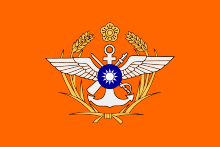 Flag of the Ministry of National Defense | |
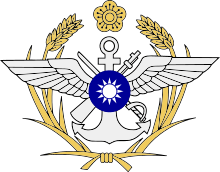 Emblem of the Ministry of National Defense | |
| Agency overview | |
|---|---|
| Formed | 1912 (as Ministry of War) 1946 (as MND) |
| Jurisdiction | |
| Headquarters | Zhongshan, Taipei |
| Minister responsible |
|
| Parent agency | Executive Yuan |
| Website | www.mnd.gov.tw |
History
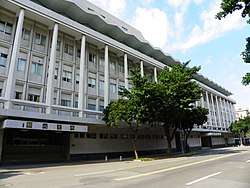
The MND was originally established as Ministry of War in 1912 at the creation of the Republic of China. It established a military occupation operation center in Taipei, Formosa in November 1945, following the Supreme Commander for the Allied Powers Douglas MacArthur's September 2, 1945 General Order No. 1, for the surrender of Japanese troops and auxiliary forces in Formosa and the Pescadores to Generalissimo Chiang Kai-shek. It was changed to the Ministry of National Defense in 1946. Military operation activities in Formosa and the Pescadores were expanded after Japan renounced its title, right, and claim to Formosa and the Pescadores based on the April 28, 1952 Treaty of Peace with Japan. The Law of National Defense and the Organic Law of the ministry were officially promulgated for implementation on 1 March 2002.[1]
On 8 December 2014, the ministry moved out from its building from the previous one at Boai Building in Zhongzheng District to the current one in Dazhi area at Zhongshan District, where it houses the Air Force Command Headquarters, Navy Command Headquarters and Hengshan Military Command Center.[2] The completion of the building had been delayed for nearly two decades due to the compound original architecture and the bankruptcy of the project's original contractor. The planning for the new building and relocation had been done since 1997.[3] The official ribbon-cutting ceremony was held on 27 December 2014.[4]
Headquarters
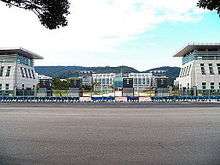
The headquarters of the military was originally in eastern Nanjing near Ming Palace. Today it is located in Dazhi area of Zhongshan District in Taipei. The 8-story main building was constructed at a cost of NT$15.8 billion, spreading over 19.5 hectares of area, which houses office buildings, dormitories and other facilities, such as post office, barbershop, sports center, conference hall and sport center to accommodate its 3,000 military personnel stationed there. It also includes several annex buildings around.[5]
The security features of the building include fingerprint and eye scanners that restrict access to certain areas, sensors that can detect vehicles in the unauthorized areas and that may carry explosives and bollards on the compound to block unauthorized vehicles. The compound also has eco-friendly features, such as stone walls, aluminum and low-emission exterior glass panels. The central air conditioning system is provided by ice storage system to reduce peak load electricity demand. The building also has rainwater collecting facilities which can store up to 1,000 tons of water, complete with its waste water treatment and filtering systems.[4]
Budget
The current annual defense budget for Taiwan is NT$320 billion.[6]
Organizational structure
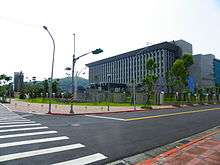
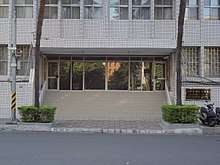
Military institutions
- Armed Forces Reserve Command (後備指揮部)
- Military Police Command (憲兵指揮部)
- Symphonic Band of the Ministry of National Defense (国防部交响乐队)
Military authorities
- Army Command Headquarters (陸軍司令部)
- Navy Command Headquarters (海軍司令部)
- Air Force Command Headquarters (空軍司令部)
Headquarter departments
- Department of Strategic Planning (戰略規劃司)
- Department of Resources Planning (資源規劃司)
- Department of Military Justice (法律事務司)
- Department of Integrated Assessment (整合評估司)
- Office of the Inspector General (總督察長室)
- All-out Defense Mobilization Office (全民防衛動員室)
- National Defense Procurement Office (國防採購室)
- National Defense Technology Division (國防科技處, after 1 January 2017)[7]
- Administration Office (政務辦公室)
- Personnel Office (人事室)
- Ethics Office (政風室)
- Accounting Office (主計室)
Secondary or Affiliated authorities
- Political Warfare Bureau
- Armaments Bureau
- Comptroller Bureau (主計局)
- Medical Affairs Bureau
General Staff Headquarters
- Office of the Deputy Chief of the General Staff for Personnel (人事參謀次長室)
- Office of the Deputy Chief of the General Staff for Intelligence (情報參謀次長室)
- Office of the Deputy Chief of the General Staff for Operations and Planning (作戰及計畫參謀次長室)
- Office of the Deputy Chief of the General Staff for Logistics (後勤參謀次長室)
- Office of the Deputy Chief of the General Staff for Communications, Electronics and Information (通信電子資訊參謀次長室)
- Office of the Deputy Chief of the General Staff for Training (訓練參謀次長室)[8]
- Communication Development Office (電訊發展室)
- Missile Command of the General Staff (參謀本部飛彈指揮部)
List of Ministers of War
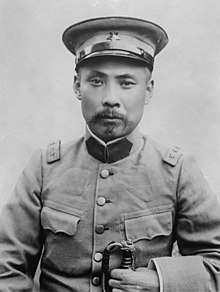
1. Ministers of War during the Republic of China (1912-1928) (歷代陸軍總長):
- Duan Qirui (段祺瑞):1912–1915; 1st time
- Zhou Ziqi (周自齊):1913–1914
- Wang Shizhen (王士珍):1914–1916; 1st time
- Duan Qirui (段祺瑞):1916–1917; 2nd time
- Zhang Shiyu (張士鈺):1917
- Wang Shizhen (王士珍):1917; 2nd time
- Duan Qirui (段祺瑞):1917; 3rd time
- Wang Shizhen (王士珍):1917–1918; 3rd time
- Duan Zhigui (段芝貴):1918–1919
- Jin Yunpeng (靳雲鵬):1919–1921; 1st time
- Cai Chengxun (蔡成勛):1921
- Bao Guiqing (鮑貴卿):1921–1922
- Wu Peifu (吳佩孚):1922
- Zhang Shaozeng (張紹增):1922–1923
- Wang Tan (王坦):1923; 1st time
- Jin Shaozeng (金紹曾):1923–1924; 2nd time
- Lu Jin (陸錦):1924
- Li Shucheng (李書城):1924
- Wu Guangxin (吳光新):1924–1925
- Jia Deyao (賈德耀):1925–1926; Anhui clique
- Zhang Jinghui (張景惠):1926–1927
- He Fenglin (何豐林):1927–1928
2. Ministers of War during the National Government of the Republic of China (歷代軍政部長):
- Feng Yuxiang (馮玉祥):1928–1929; Kuomintang
- Lu Zhonglin (鹿鍾麟):1929; Kuomintang
- Chen Yi (陳儀):1929; Kuomintang
- Lu Zhonglin (鹿鍾麟):1929; Kuomintang
- Zhu Shouguang (朱綬光):1929–1930; Kuomintang
- He Yingqin (何應欽):1930–1944; Kuomintang
- Chen Cheng (陳誠):1944–1946; Kuomintang
3. Ministers of the Navy during the Republic of China (1912-1928) (歷代海軍總長):
- Liu Guanxiong (劉冠雄):1912–1916; 1st time
- Cheng Biguang (程璧光):1916–1917; 1st time
- Sa Zhenbing (薩鎮冰):1917; 1st time
- Liu Guanxiong (劉冠雄):1917–1919; 2nd time
- Sa Zhenbing (薩鎮冰):1919–1921; 2nd time
- Li Dingxin (李鼎新):1921–1924; 2nd time
- Du Xigui (杜鍚圭):1924; 1st time
- Lin Jianzhang (林建章):1924–1925; 1st time
- Du Xigui (杜鍚圭):1925–1927; 2nd time
4. Ministers of the Navy during the National Government of the Republic of China (歷代海軍部長):
- Yang Shuzhuang (楊樹莊):1929–1932; Kuomintang
- Chen Shaokuan (陳紹寬):1932–1938; Kuomintang
5. Chiefs of Staff during the Republic of China (1912-1928) (歷代參謀總長):
- Huang Xing (黄興):1912; 1st time
- Xu Shaozhen(徐紹楨):1912; 1st time
- Li Yuanhong (黎元洪):1912–1915; 1st time
- Feng Guozhang (馮國璋):1915–1916; 1st time
- Duan Qirui (段祺瑞):1916; 1st time
- Wang Shizhen (王士珍):1916–1917; 1st time
- Yin Chang (蔭昌):1917–1919; 1st time
- Zhang Huaizhi (張懷芝):1919–1924; 1st time
- Li Liejun (李烈鈞):1924–1925; 1st time
- Yang Sen (楊森):1925–1926; 1st time
- Liu Ruxian (劉汝賢):1926; 1st time
- Liu Xiang (劉湘):1926–1927; 1st time
6. Chiefs of Staff during the National Government of the Republic of China (歷代參謀總長):
- Li Jishen (李濟深):1928–1929; Kuomintang
- He Yingqin (何應欽):1929; Kuomintang
- Zhu Peide (朱培德):1929–1932; Kuomintang
- Chiang Kai-shek (蔣中正):1932–1935; Kuomintang
- Cheng Qian (程潛):1935–1938; Kuomintang
- He Yingqin (何應欽):1938–1946; Kuomintang
7. Directors of Training (歷代訓練總監部長):
- He Yingqin (何應欽):1928–1931; Kuomintang
- Li Jishen (李濟深):1931–1933; Kuomintang
- Zhu Peide (朱培德):1933–1934; Kuomintang
- Tang Shengzhi (唐生智):1934–1938; Kuomintang
- Bai Chongxi (白崇禧):1938–1946; Kuomintang
8. 歷代軍事參議院長:
- Li Zongren (李宗仁):1928–1929; Kuomintang
- Tang Shengzhi (唐生智):1929–1931; Kuomintang
- Zhang Jinghui (張景惠):1931; Kuomintang
- Zhang Yipeng (張翼鵬):1931–1934; Kuomintang
- Chen Tiaoyuan (陳調元):1934–1943; Kuomintang
- Li Jishen (李濟深):1943–1945; Kuomintang
- Long Yun (龍雲):1945–1946; Kuomintang
List of Ministers of National Defence
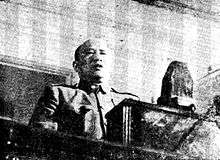
.jpg)
Ministers of National Defense
For ministers that retired from the Armed Forces to serve, the Service column denotes their military branch before retirement.[9]
| No. | Minister of National Defense | Took office | Left office | Time in office | Party | Defence branch | Premier | |
|---|---|---|---|---|---|---|---|---|
| 1 | Bai Chongxi (白崇禧) (1893–1966) | 23 May 1946 | 2 June 1948 | 2 years, 10 days | Kuomintang | T. V. Soong Chiang Kai-shek Chang Ch'ün Weng Wenhao | ||
| 2 | He Yingqin (何應欽) (1890–1987) | 3 June 1948 | 21 December 1948 | 201 days | Kuomintang | Weng Wenhao Sun Fo | ||
| 3 | Xu Yongchang (徐永昌) (1885–1959) | 22 December 1948 | 30 April 1949 | 129 days | Kuomintang | Sun Fo He Yingqin | ||
| (2) | He Yingqin (何應欽) (1890–1987) | 1 May 1949 | 11 June 1949 | 41 days | Kuomintang | He Yingqin Yan Xishan | ||
| 4 | Yan Xishan (閻錫山) (1883–1960) | 12 June 1949 | 31 January 1950 | 233 days | Kuomintang | Yan Xishan | ||
| 5 | Gu Zhutong (顧祝同) (1893–1987) | 1 February 1950 | 31 March 1950 | 58 days | Kuomintang | Yan Xishan Chen Cheng | ||
| 6 | Yu Ta-wei (俞大維) (1897–1993) | 1 April 1950 | 28 February 1951 | 333 days | Independent | Chen Cheng | ||
| 7 | Kuo Chi-chiao (郭寄嶠) (1902–1998) | 1 March 1951 | 31 May 1954 | 3 years, 91 days | Kuomintang | Chen Cheng | ||
| (6) | Yu Ta-wei (俞大維) (1897–1993) | 1 June 1954 | 13 January 1965 | 10 years, 226 days | Independent | Chen Cheng Yu Hung-Chun Chen Cheng Yen Chia-kan | ||
| 8 | Chiang Ching-kuo (蔣經國) (1910–1988) | 14 January 1965 | 30 June 1969 | 4 years, 167 days | Kuomintang | Yen Chia-kan | ||
| 9 | Huang Chieh (黄杰) (1902–1995) | 1 July 1969 | 31 May 1972 | 2 years, 335 days | Kuomintang | Yen Chia-kan Chiang Ching-kuo | ||
| 10 | Chen Ta-ching (陳大慶) (1904–1973) | 1 June 1972 | 30 June 1973 | 1 year, 29 days | Kuomintang | Chiang Ching-kuo | ||
| 11 | Kao Kuei-yuan (高魁元) (1907–2012) | 1 July 1973 | 19 November 1981 | 8 years, 141 days | Kuomintang | Chiang Ching-kuo Sun Yun-suan | ||
| 12 | Song Chang-chih (宋長志) (1916–2002) | 1 December 1981 | 30 June 1986 | 4 years, 211 days | Kuomintang | Sun Yun-suan Yu Kuo-hua | ||
| 13 | Wang Daoyuan (汪道淵) (1913–2011) | 1 July 1986 | 28 April 1987 | 301 days | Kuomintang | Civilian | Yu Kuo-hua | |
| 14 | Cheng Wei-yuan (鄭為元) (1913–1993) | 29 April 1987 | 4 December 1989 | 2 years, 219 days | Kuomintang | Yu Kuo-hua Lee Huan | ||
| 15 | Hau Pei-tsun (郝柏村) (1919–2020) | 5 December 1989 | 31 May 1991 | 1 year, 177 days | Kuomintang | Lee Huan | ||
| 16 | Chen Li-an (陳履安) (born 1937) | 1 June 1991 | 26 February 1993 | 1 year, 270 days | Kuomintang | Civilian | Hau Pei-tsun Lien Chan | |
| 17 | Sun Chen (born 1934) (孫震) (born 1934) | 27 February 1993 | 15 December 1994 | 1 year, 291 days | Kuomintang | Civilian | Lien Chan | |
| 18 | Chiang Chung-ling (蔣仲苓) (1922–2015) | 16 December 1994 | 31 January 1999 | 4 years, 46 days | Kuomintang | Lien Chan Vincent Siew | ||
| 19 | Tang Fei (唐飛) (born 1932) | 1 February 1999 | 19 May 2000 | 1 year, 108 days | Kuomintang | Vincent Siew | ||
| 20 | Wu Shih-wen (伍世文) (born 1934) | 20 May 2000 | 31 January 2002 | 1 year, 256 days | Kuomintang | Tang Fei Chang Chun-hsiung | ||
| 21 | Tang Yao-ming (湯曜明) (born 1938) [lower-alpha 1] | 1 February 2002 | 19 May 2004 | 2 years, 108 days | Kuomintang | Yu Shyi-kun | ||
| 22 | Lee Jye (李傑) (born 1940) [lower-alpha 2] | 20 May 2004 | 19 May 2007 | 2 years, 364 days | Independent | Yu Shyi-kun Frank Hsieh Su Tseng-chang | ||
| 23 | Lee Tien-yu (李天羽) (born 1940) | 20 May 2007 | 24 February 2008 | 280 days | Kuomintang | Su Tseng-chang I Chang Chun-hsiung | ||
| 24 | Michael Tsai (蔡明憲) (born 1941) | 25 February 2008 | 19 May 2008 | 84 days | DPP | Civilian | Chang Chun-hsiung | |
| 25 | Chen Chao-min (陳肇敏) (born 1940) | 20 May 2008 | 9 September 2009 | 1 year, 112 days | Kuomintang | Liu Chao-shiuan | ||
| 26 | Kao Hua-chu (高華柱) (born 1946) | 10 September 2009 | 31 July 2013 | 3 years, 324 days | Kuomintang | Wu Den-yih Sean Chen Jiang Yi-huah | ||
| 27 | Andrew Yang (楊念祖) (born 1946) | 1 August 2013 | 7 August 2013 | 6 days | Independent | Civilian | Jiang Yi-huah | |
| 28 | Yen Ming (嚴明) (born 1949) | 8 August 2013 | 30 January 2015 | 1 year, 175 days | Kuomintang | Jiang Yi-huah Mao Chi-kuo | ||
| 29 | Kao Kuang-chi (高廣圻) (born 1950) | 31 January 2015 | 19 May 2016 | 1 year, 109 days | Kuomintang | Mao Chi-kuo Chang San-cheng | ||
| 30 | Feng Shih-kuan (馮世寬) (born 1945) | 20 May 2016 | 26 February 2018 | 1 year, 282 days | Independent | Lin Chuan William Lai | ||
| 31 | Yen Teh-fa (嚴德發) (born 1952) | 26 February 2018 | Incumbent | 2 years, 172 days | Independent | William Lai Su Tseng-chang II |
See also
Notes
- Kuomintang membership suspended.
- KMT membership revoked.
References
- John Pike. "Ministry of National Defense". globalsecurity.org.
- "Defense Ministry's new compound to be officially opened Dec. 8". focustaiwan.tw.
- "Defense minister raises flag at new ministry compound". focustaiwan.tw.
- "Defense Ministry's new headquarters officially opens". cna.com.tw.
- "Taipei military complex opened". taipeitimes.com.
- "Difficult to set defense budget at 3% of GDP: premier - Politics - FOCUS TAIWAN - CNA ENGLISH NEWS".
- "Defense ministry confirms new agency - Taipei Times". www.taipeitimes.com. Retrieved 11 August 2018.
- "MND Organization" (PDF). Ministry of National Defense, ROC. Archived from the original (PDF) on 2016-12-31.
- 歷任部長 [Past Ministers]. mnd.gov.tw (in Chinese). Ministry of Nat'l Defense. Retrieved 22 February 2017.
External links
| Wikimedia Commons has media related to Ministry of National Defense (Republic of China). |
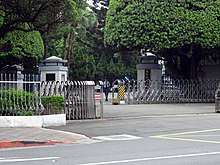
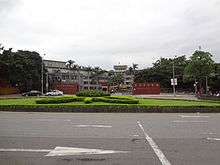
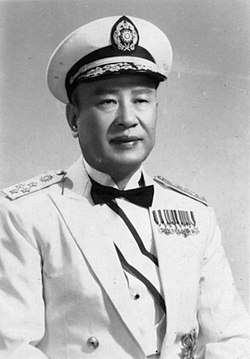
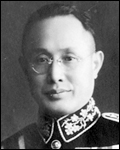
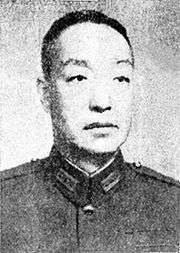

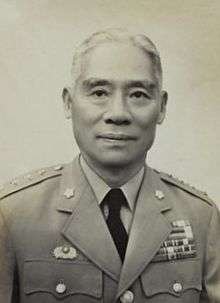
.jpg)
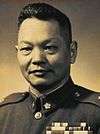
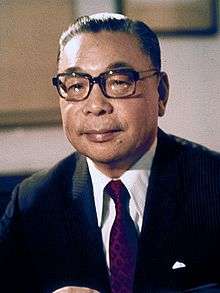
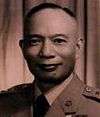
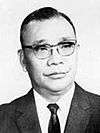
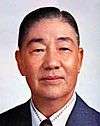
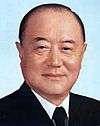

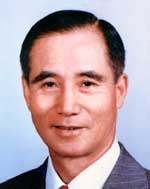
-cropped.jpeg)
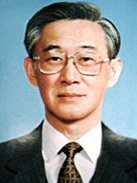
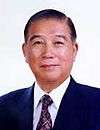
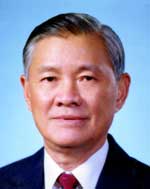
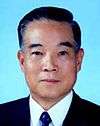
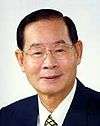
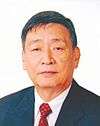

.jpg)
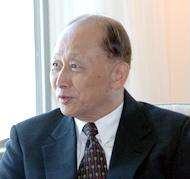
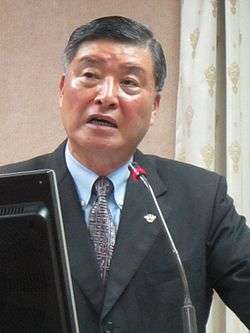
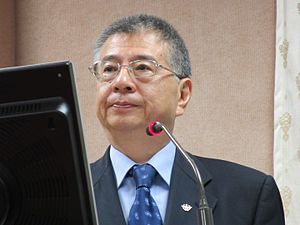

.jpg)
.jpg)
